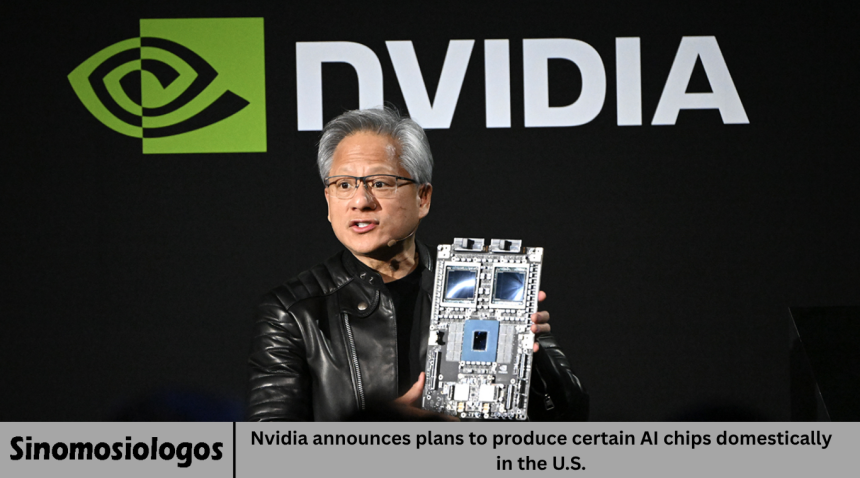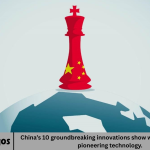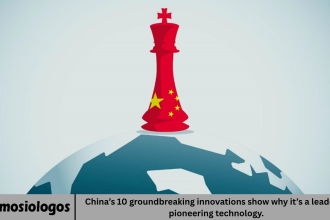Nvidia, a leading company in graphics processing and artificial intelligence (AI) technology, recently announced its plans to manufacture some of its AI chips domestically in the United States. This move is significant because it marks a shift toward increasing U.S. production of advanced semiconductor technologies. It also reflects broader trends in the tech industry related to supply chain security, innovation, and economic competitiveness.
This article explores Nvidia’s announcement in detail. We will look at why this decision matters, how it fits into the global chip manufacturing landscape, the potential impact on the industry, and what it means for the future of AI technology. By understanding this development, readers can gain insights into the evolving semiconductor market and the role of AI chips in modern technology.
Nvidia’s Role in AI and Semiconductor Industry
Nvidia is widely known for its powerful graphics processing units (GPUs) used in gaming, professional graphics, and increasingly, AI and data center applications. Over the years, Nvidia has become a critical player in AI hardware by designing chips that accelerate machine learning, data analysis, and other complex computations.
AI chips are specialized processors designed to handle AI workloads much faster and more efficiently than traditional CPUs. These chips power many of today’s AI innovations, from self-driving cars to voice assistants and data centers that process huge amounts of information.
Nvidia’s success comes from combining cutting-edge hardware with software tools that help developers build AI applications. The company’s influence spans gaming, cloud computing, automotive, and scientific research sectors.
Why Manufacturing AI Chips in the U.S. Matters
Manufacturing semiconductors is a complex and highly specialized process. For many years, much of the world’s chip production has been concentrated in countries like Taiwan, South Korea, and China. However, recent geopolitical tensions, supply chain disruptions, and the strategic importance of semiconductors have led to a renewed focus on domestic manufacturing in the U.S.
Nvidia’s decision to produce some AI chips in the U.S. reflects several important factors:
-
Supply Chain Security: Producing chips domestically helps reduce reliance on overseas suppliers, making supply chains more resilient to global disruptions.
-
Technological Leadership: Manufacturing chips close to where they are designed fosters better collaboration, faster innovation, and improved quality control.
-
Economic Growth: Domestic production creates jobs, boosts local economies, and strengthens the country’s position in the high-tech manufacturing sector.
-
National Security: Advanced chips are crucial for defense and critical infrastructure, so having secure production facilities is a strategic priority.
By investing in U.S.-based manufacturing, Nvidia aligns with government initiatives that support domestic semiconductor production and innovation.
The Global Chip Manufacturing Landscape
The semiconductor industry is global and highly interconnected. Some of the most advanced chip fabrication plants (fabs) are located in Asia. Companies like Taiwan Semiconductor Manufacturing Company (TSMC) and Samsung dominate the production of the latest generation chips.
However, there has been growing concern about the concentration of chip production in specific regions. Natural disasters, political conflicts, or trade restrictions could disrupt supply chains and impact global technology markets.
To address these concerns, governments and companies worldwide are increasing investments in domestic chip manufacturing. The U.S. government, for example, has passed legislation providing billions in funding to support semiconductor research and production on American soil.
Nvidia’s move to produce AI chips domestically is part of this larger trend. While many chips will continue to be manufactured overseas due to the complexity and cost of fabs, expanding U.S. production helps diversify and secure supply chains.
How Nvidia Plans to Manufacture AI Chips in the U.S.
Details about Nvidia’s manufacturing plans include partnerships with existing U.S.-based semiconductor manufacturers and investments in new facilities. Nvidia will likely collaborate with foundries that specialize in chip fabrication, integrating its design expertise with their manufacturing capabilities.
Nvidia’s chips are designed using advanced processes requiring state-of-the-art manufacturing technology. While Nvidia does not own large-scale fabs like TSMC, it focuses on chip design and partners with foundries to produce the physical chips.
The company’s plan to manufacture AI chips in the U.S. may involve building or expanding facilities, upgrading production lines, and employing highly skilled workers. These steps will help Nvidia meet growing demand for AI hardware and reduce risks associated with overseas manufacturing.
Benefits for the U.S. Economy and Tech Industry
Nvidia’s investment in U.S.-based chip manufacturing can have significant positive effects on the economy and technology sector:
-
Job Creation: Building and operating chip manufacturing facilities creates thousands of jobs, from engineers and technicians to factory workers.
-
Innovation Hub: Domestic manufacturing attracts related businesses and research institutions, creating a cluster of innovation.
-
Competitive Advantage: Local production helps U.S. companies respond faster to market needs and develop cutting-edge technologies.
-
Trade Balance: Producing more chips domestically reduces imports and strengthens the U.S. position in the global tech market.
This initiative also supports the government’s broader goals to enhance the country’s technological independence and leadership.
Challenges and Considerations
While manufacturing AI chips in the U.S. has many benefits, it also presents challenges:
-
High Costs: Building and operating fabs is expensive, often costing billions of dollars.
-
Complex Technology: Advanced chip production requires precise control, cleanroom environments, and continuous innovation.
-
Talent Shortage: Finding and retaining skilled workers can be difficult given the specialized knowledge required.
-
Global Competition: Other countries are also investing heavily in semiconductor manufacturing, leading to fierce competition.
Nvidia will need to navigate these challenges carefully to succeed in expanding U.S. chip production.
The Future of AI Chip Manufacturing
The demand for AI chips is growing rapidly as AI technologies become more widespread. Nvidia’s plans to increase U.S.-based manufacturing reflect a larger trend that is likely to continue.
We can expect to see further investments in domestic fabs, new technologies to improve chip performance and efficiency, and deeper collaboration between governments, companies, and research institutions.
This evolution will shape the future of AI development and impact many industries, including healthcare, automotive, finance, and entertainment.
As the demand for AI continues to grow, Nvidia’s move may inspire other companies to invest in local production, helping create a more balanced and secure global chip ecosystem.
This development marks a new chapter in the future of AI hardware and the semiconductor industry, promising exciting opportunities ahead.
Frequently Asked Questions
What are AI chips, and why are they important?
AI chips are specialized processors designed to efficiently run artificial intelligence tasks. They enable faster data processing, making AI applications possible in many fields.
Why is Nvidia producing AI chips in the U.S. now?
Nvidia aims to improve supply chain security, support innovation, create jobs, and align with government initiatives promoting domestic semiconductor manufacturing.
How does manufacturing AI chips in the U.S. benefit consumers?
Domestic production can lead to faster product availability, better quality control, and potentially lower prices by reducing dependence on overseas supply chains.
What challenges does Nvidia face in U.S.-based manufacturing?
High costs, complex technology, competition from global players, and the need for skilled labor are some key challenges.
Will Nvidia stop manufacturing chips overseas?
No, Nvidia will continue to work with international partners, but expanding U.S. manufacturing helps diversify supply chains and reduce risks.
Conclusion
Nvidia’s announcement to manufacture some AI chips in the United States is a significant step for the company and the broader technology industry. It highlights the importance of secure and resilient supply chains, innovation leadership, and economic growth.
By producing AI chips domestically, Nvidia not only strengthens its own position but also contributes to the U.S.’s strategic goals in semiconductor manufacturing and technology advancement.














